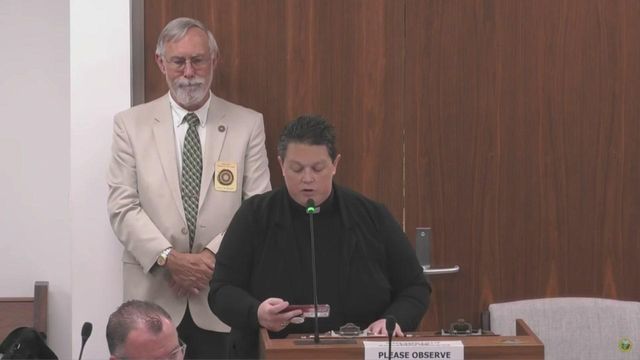Goldsboro keeps wary eye on upstream coal ash ponds
Like most folks in Goldsboro, Ricky Richardson doesn't think of coal ash as a local problem.
Recent news coverage has focused on the spill of almost 40,000 tons of ash into the Dan River hundreds of miles away at Eden, but an even larger ash pond sits 10 miles upstream from Goldsboro's water intake on the Neuse River.
"I have seen it on TV – I have seen it in other places like Virginia and like that – but not here in Goldsboro," Richardson said.
Richardson's response doesn't surprise Goldsboro Mayor Al King. "The average citizen is not aware of it, but we are," he said.
Duke Energy shut down the coal-fired H.F. Lee Plant near Goldsboro in 2012, replacing it with a natural gas-fired plant. About 645 million gallons of coal ash produced by the former Progress Energy plant for five decades still sit, however, in three huge, unlined pits next to the river.
Neuse Riverkeeper Matthew Starr says the trio of ash ponds is so close to the river that he can throw a rock from the bank to the top of the earthen dam that contains one pond.
State regulators rate the ponds' dams as a high hazard for failure. That's similar to the rating given to the ash pond in Eden, but the Goldsboro site holds four times more toxic sludge.
Goldsboro is prepared for the worst, King said, with a five-day water reservoir that can be cut off from the river if the ash pond dams ever fail.
"Hopefully, we won't have to do that, but if we have to, we have to," he said.
Damage is already occurring near the site, even without a major ash spill. Cancer-causing pollutants have been leaking into the groundwater from the ponds for years.
"It's continuously happening," Starr said, noting tests of nearby groundwater show levels of arsenic 60 times greater than federal drinking water standards.
Levels of arsenic and heavy metals in the groundwater have violated safety levels repeatedly for the past few years. State environmental regulators have done nothing to halt the damage, and neither Progress nor Duke has been penalized.
Susan Massengale, a spokeswoman for the state Department of Environment and Natural Resources, said the contamination at the Goldsboro site is part of a lawsuit the state filed last August against Duke for coal ash violations across North Carolina.
Massengale confirmed, however, that the state hadn't taken any action against Duke before that for violating the state water-quality regulations or to force it to stop.
"There’s various cleanup actions we could have taken with them at the time," she said. "As long as they moved forward in executing those actions as we required, then the thought was to not fine them. If they did not do what we required, to look then at compliance actions.”
There are no state records of cleanup actions required of Duke at the Goldsboro site, she said, adding the lawsuit has "kind of frozen that process."
Duke spokeswoman Paige Sheehan said the utility is in the process of imploding the defunct coal-fired plant and is committed to safely disposing of the coal ash. She declined to say how or when that would happen.
Sheehan also said Duke's tests show no environmental damage to the Neuse River by the coal ash ponds.
Groundwater arsenic levels have exceeded safety standards for almost four years, but Massengale said results from monitoring wells near the ash ponds can vary from month to month.
"It’s not simple and straightforward. It’s underground. It’s not that easy," she said. "We’re watching what data points we’re getting from these wells, trying to determine what’s going on at these sites.”
Goldsboro's water system is able to remove arsenic and metals from the water, King said, but residents who have private wells don't have that protection.
Starr said there's only one solution to the threat posed by the ash ponds near Goldsboro and Duke's 29 other ash ponds across North Carolina.
"The coal ash needs to be removed," he said. "It needs to be put in landfills that are lined and moved away from surface waters."
King agreed and is pushing Duke to take action.
"They put it there, and it is their responsibility to clean it up," he said.










